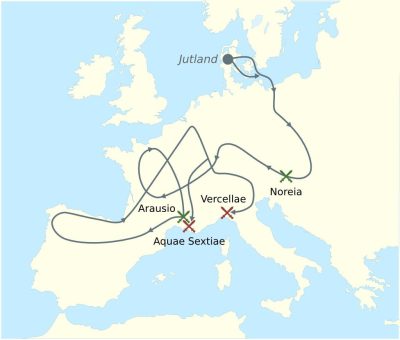Chapters
Battle of Aquae Sextiae (102 BCE) was a great victory for Roman troops led by consul Gaius Marius over the tribe of Teutons.
Background of events
Threats never spared the Roman Republic. More than 100 years have passed since the famous Hannibal ante portas!, Carthage has been demolished, Macedonia is subjugated. However, at the end of the 2nd century BCE, there was another danger. From distant Jutland, the Germanic tribes, the Cimbri and the Teutons began their march south, and others joined them. And as it soon turned out, the Germans were a deadly rival whose disregard would be just utter foolishness.
Aggressive migration
It is impossible to describe the Battle of Aquae Sextiae without first mentioning the great migration of the Germans, which was the direct cause of the battle. The Cimbri tribe decided to find a new homeland for themselves, to settle in new lands. So they moved south from the Jutland Peninsula. Everyone was walking. Families with all their belongings began their journey. Other tribes soon joined them, the most notable of which were the Teutons. They crossed all of Germany and reached Noricum, a Celtic-Illyrian region north of the Alps. The Romans, concerned about the very large migration towards their territory, sent a consular army to Noricum. The Germans, in turn, crossed the Danube and continued their journey. The meeting with Roman forces took place near Noreia, where the first battle of the Republic’s army with the barbarians took place. In the heart of Italy, anxiety grew even more when it found that the army sent to the north had been smashed and most of the legionaries lay dead on the battlefield. Although the defeated legions inflicted heavy losses on the invaders, they still constituted a force that could threaten the Republic. Fortunately for Rome, the Germans found the Alps to be a more dangerous obstacle than the Rhône and, bypassing Italy, headed west towards Gaul (southern France). These areas were then under the control of Rome, so the Republic sent armies to neutralize the threat, but these suffered a series of humiliating disasters, the most severe of which was that at Arausio in 105 BCE. Some sources mention as many as 100,000 fallen Romans. This data is probably exaggerated, but it clearly shows the extent of the defeat, which was probably caused by the incompetence of the commanders and their lack of cooperation skills.
It was then in Rome that anxiety was replaced by fear. The road to Italy was open, a state of emergency arose, an extraordinary problem for which an extraordinary man was needed to be solved. And so all eyes turned to the recent conqueror of the Numidian king of Jugurtha. Gajus Marius, because we are talking about him, was elected his second consulate despite legal adversities. It was in 105 BCE
Eternal Consul
Marius was lucky. The Germans did not go to Italy, but instead continued west towards Iberia. Thanks to this, the new old consul had time to prepare the army for the upcoming campaign. Many of Marius’s military achievements can be attributed to the excellent military discipline he promotes. The very efficient administration was also important, as it greatly facilitated all activities. Before any clash took place, Marius took over his third consulate. Given enough time, he sent his troops to dig a channel at the mouth of the Rhone, which allowed him to improve the supply lines.
The migrating tribes decided to split up, however. The Cimbri and Tigurini (Celtic people who joined the great migration) wanted to bypass the Alps and get to Italy. The Teutons and the Ambrons (another Germanic tribe) walked around the camp of Marius who was in his place and also headed towards Italy. Gaius Marius kept his soldiers in the camp so that they would get used to the sight of the barbarians. In his opinion, it would increase the fortitude and morale of Roman soldiers.
Marius, in the meantime taking over his fourth consulate, broke the camp and started chasing the Teutons and Ambrones. He caught up with them at Aquae Sextiae (today’s Aix-en-Provence in France). It was 102 BCE
The great battle
Condition of both armies:
- over 100,000 Teutons and Ambrons (including women and children who stayed in the camp) under the leadership of King Teutobod
- 32,000 men, Roman legions and Italic allies under the command of consul Gaius Marius
Gaius Marius was well aware of the overwhelming advantage in numbers of the enemy. So he had to develop a plan that would prevent its use. The consul ordered to fortify the camp on the hill. However, there was an unexpected situation. The Romans, going to the river to get water, encountered the Ambrons, who were the Teutons’ vanguard. The Germans also took water, but they did it on the opposite bank. There was a clash at the watering hole. Soon other Romans and the rest of the Ambros joined the skirmish. They decided to cross the river, which Marius’s soldiers were waiting for. When most of the invaders’ vanguard came out of the water, they were massacred by legionaries and auxilia. The consul was expecting a night attack, so the Romans stayed awake all night, expecting a fight. The remnants of the Ambrons were waiting for the Teutons, who were the main forces, but they did not want to attack the Roman camp immediately. The barbarians waited two days until finally decided to fight. They decided to take the hill by storm. Marius was a cunning commander and he knew that if something went wrong, he would need an ace up his sleeve. So he prepared an ambush. He hid 3,000 soldiers on a wooded hill. The Teutons, meanwhile, began their attack. They went decisively uphill, but the hail of spears thrown by the legionaries slightly weakened their eagerness. There were many Germans. The attacking barbarians were therefore crowded, and the Romans’ throwing pila thinned their ranks. Then Marius’ army attacked King Teutobod’s warriors down the hill, ruthlessly pushing them back. Gladius repeatedly sank into the bodies of the cramped Germans, who often did not even have room to defend themselves against such blows. After some time, the Romans pushed the barbarians completely off the hill, so the advantage of the terrain disappeared, they continued to fight on level ground. King Teutobod tried to cheer the already scared warriors into battle, but then 3,000 Romans fell out of the forest to their rear. This was too much for the panicked Germans. They rushed to flee, but on both sides, they were chased by the revenge sword of Rome. Thousands of barbarians fell dead, littering the earth at Aquae Sextiae. It is estimated that maybe even about 90,000 warriors died, with very little Roman losses. However, it was not enough for Marius. He wished to annihilate these tribes so that they would never again dare to raise their sword against Rome. At the head of his troops, he rushed into the enemy camp, taking thousands of prisoners. At first, the soldiers were surprised by the fierce resistance of Germanic women, but the latter was quickly suppressed, and after some time the women and their children ended up at the slave market. The Teuton problem was solved once and for all. Marius realized, however, that this was only half of his task. Italy was still under threat from the Cimbri.
Further fate of the campaign against the Germans
In 101 BCE Gaius Marius became a consul for the fifth time. The second consul was not, however, such a seasoned commander as he was and withdrew from the Cimbri, giving them the entire Po valley. After winning at Aquae Sextiae, Marius joined the second army and took command of the combined forces. He clashed with the Cimbri at Vercellae. John Warry notes that the Germans were pretty well commanded and had good weapons as well. However, the Romans were helped by the prevailing heat, to which they were more used than their enemies. The fight took place in great disarray, which is understandable because a sandstorm had arrived. Eight legions, backed by allies (a total of around 50,000 soldiers), smashed the 200,000 Cimbri horde under King Boeorix (including women and children who did not take part in the battle).
Gaius Marius saved Rome from catastrophe by defeating the forces of the migrating Germans in two great battles. The great migration of peoples from Jutland was completed and the capital of the Republic was able to breathe again. After returning to Rome, Marius triumphed and in recognition of the enormous merits that included saving the country from great danger, he was hailed as “the third founder of Rome”. Thus, he was equated with such legendary figures as Romulus and Camillus. Marius won, Marius became a hero.



